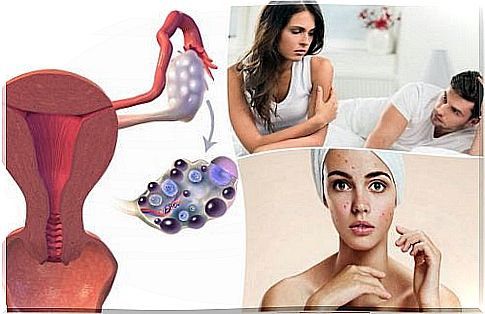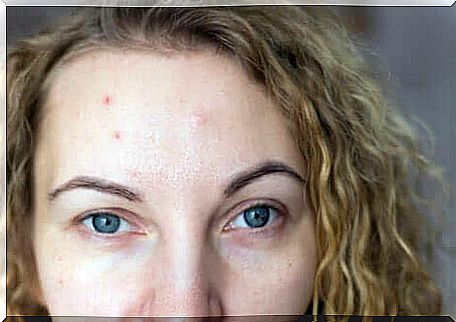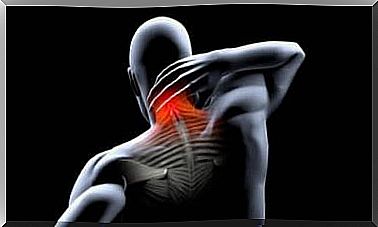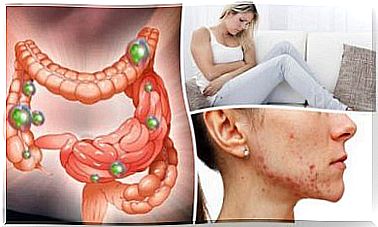7 Symptoms Of Polycystic Ovary Syndrome That You Should Not Overlook
Although they can be associated with other conditions separately, suffering from several of these symptoms simultaneously should get you to see a doctor so that they can ask about the health of your ovaries.

Some of the symptoms of polycystic ovary syndrome (PCOS) can vary from person to person, but to a greater or lesser extent they occur in most cases.
Polycystic Ovary Syndrome (PCOS) is a hormone-related problem that affects a woman’s quality of life due to its impact on her health when not treated properly.
Let’s see a little more about the symptoms that characterize it, so that you can see the importance of treating them in time.
Polycystic ovary syndrome
In general, PCOS can be described as a condition in which small cysts or follicles form in the ovaries, in addition to causing thickening of the ovarian wall.
According to Dr. JoAnn V. Pinkerton, PCOS “causes disruption of the menstrual cycle and a tendency to have high levels of male hormones (androgens)”.
Since it is produced by high levels of androgens, also called “male hormones,” women with PCOS can have fertility problems if not treated properly.

Symptoms of PCOS
Here are the main symptoms of PCOS that you should watch out for and talk to your doctor about if they occur.
1. Spots on the skin
There are many factors that can influence the appearance of dark spots on the skin. When they form suddenly, in visible areas, it is most likely that they are caused by a hormonal imbalance.
Women whose androgen production is out of control usually have far too high insulin levels in their blood. This is why spots can form on:
- Neck
- Armpits
- Face
- Hands
- Upper thigh area
2. Difficulty giving birth or infertility
Most women with polycystic ovary syndrome usually have unhealthy eggs and uterus.
In the majority of cases, the consequence of this condition is a drop in ovulation. They therefore very quickly have problems getting pregnant and giving birth.
Hormonal imbalances make conception difficult. Even if it does intervene, it can be more difficult and present significant risks.
However, thanks to medical advances, treatments can allow women to regain normal ovulation, especially those based on contraceptive drugs.
3. Weight gain
Uncontrolled weight gain can have its origins in hormonal imbalances which are the consequence of polycystic ovary syndrome.
Unfortunately, more than half of patients suffering from this condition have these types of symptoms.
This problem can be reduced by adopting a healthy diet and regular exercise. But it is essential, if you suffer from this pathology, to consult a professional to regulate your hormonal production.
4. Chronic acne
Acne is another symptom of polycystic ovary syndrome. This skin problem that can have different levels of severity, which are usually a function of the factor that causes it. It causes unsightly pimples that often appear on the face. This is why those who suffer from it have problems of self-esteem and insecurity.
In this case, acne is triggered by excessive testosterone production. It is a hormone that is not normally secreted in abundance by women.
5. Excessive down growth
Women who suffer from polycystic ovary syndrome can also be affected by hirsutism. That is to say by a significant growth of body down.
It is perfectly normal for women to have hair growing on certain parts of their body. But it is not normal for a large amount of thick down to suddenly appear.
It is again an uncontrolled production of testosterone which is at the origin of this phenomenon. Because the hormone changes the skin and hair follicles.
6. Hair loss
Another possible symptom of PCOS is excessive hair loss. Although this problem can have multiple causes, if it occurs along with other signs, it may indicate the presence of PCOS.
In some cases, it may be due to anemia or nutritional deficiencies. Because hair needs nutrients to stay strong.
The use of certain types of cosmetics and devices that generate heat can also weaken hair fibers.
However, when excessive hair loss is accompanied by one of the other symptoms we have just mentioned in our article, it is essential to check whether its appearance is the direct consequence of polycystic ovary syndrome.
Hormonal imbalances can directly affect hair health. But they can also interfere with the ability to absorb nutrients.
7. Anxiety and depression

Hormonal activity in patients with PCOS often causes mood swings, so other symptoms of PCOS can include depression and anxiety.
Of course, anxiety isn’t just a symptom of PCOS. It must occur at the same time as several of the symptoms we have already mentioned.
Do not delay your check-up, see your doctor
In conclusion, although the symptoms mentioned above can appear with other diseases, it is essential to analyze whether they are related to this condition.
Doctors can detect it through medical examinations and then prescribe the most appropriate treatment for each case.









